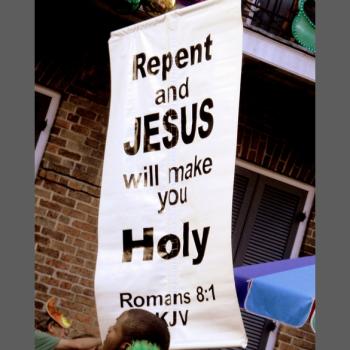It’s time we humble ourselves and stop believing our faith-practices are indisputable.

“The first problem with your religion,” says Jesus, “is how right you think you are. That prevents you from seeing an even greater problem, which is how your rituals and public professions of faith have become more important to you than love, the greatest commandment of all.”
Jesus sits on a park bench beside a historic church building, surrounded by stately trees, wrought iron fences and bronze plaques honoring deceased donors.
“You make a few good points,” says a man with jet black hair and a sports coat, “but what can be wrong with our professions of faith? This is how we bring honor and glory to your name.”
“Words are cheap,” says Jesus. “Preach the gospel at all times but use words only when necessary.[1] Faith and love are action words, not passive beliefs and feelings. My reputation is destroyed by pious professions of faith that are arrogant and self-centered.”
“Granted, wolves hide in sheepskin,” says the man, “but speaking for myself and my people, we place a high priority on authenticity and accountability. We are a non-ritualistic church. We’re very organic and family-centered. We prioritize worship and growing closer to God.”
“You can’t see it, but nearly everything you do is ritualistic.” says Jesus, “That doesn’t mean it’s all bad. You have good intentions. The main problem is that your ‘love’ is mostly verbal and expressed toward those who are easy to love, namely people who look and think like you do.”
The man shakes his head. “I don’t understand. We’ve always said that Christianity is not ritualistic. It’s about relationships, not religion. Love for God is at the heart of all we do.”
“Yes, you’ve always said that,” said Jesus, “but your ideal gets lost in your Sunday morning ‘God and pony’ show. It gets lost in your endless devotional routines and religious programs that have no connection with your neighbors.”
A middle-aged woman with a tie-dyed dress and blue-streaked hair steps forward. “It is mind-boggling to see people who have no clue how to love their neighbors singing hypnotic love songs to a ghost that’s supposed to be holy, looking all moonstruck and helpless.”
“They’re just trying to impress each other,” says her plump, gray-haired companion.
“That’s not a fair accusation,” blurts Pastor Tom, a round, balding man of about 35. “You can’t criticize people for how they choose to express their love for God.”
“If you love God,” says the blue-haired woman, “why do you hate foreigners and the poor and homeless?”
“Why do you hate gays and those who’ve had abortions?” says her friend.
“We don’t hate them!” shouts the black-haired man.
The tension in the air grows as Jesus raises a hand and pauses, looking not unlike sacred art from a gothic cathedral.
“I’d like to ask those of you who have read the Gospels: What group of people was I most critical of? Prostitutes and swindlers … or religious folk?”
“Religious folk,” say several people.
“The church people were the unloving ones in my parables. Men of faith turned their backs on a wounded man, while a despised Samaritan — who was basically a foreign ‘terrorist’ — showed love to the man. When the prodigal son was forgiven, the faithful son was outraged at his grace-filled father. When some workers received the full pay despite showing up late to work, the best workers grumbled. I reserved my harshest criticism for people of religion, while going out of my way to bless and heal Samaritan outcasts. And don’t forget it was the religious ones who crucified me.”
“But you’re talking about the Pharisees and Sadducees,” says a nun with a white habit and gray gown. “Our religion today is rooted in a better understanding of the truth.”
“Our spiritual life is not at all like the Pharisees,” says Pastor Tom. “We’re motivated by love for God.”
“As were the rituals of the Pharisees. They too were motivated by love,” says Jesus. “They intensely loved God and expressed that love in formulas, just like you. You imagine them to be stereotypical bad guys, arrogant and scornful, while presuming yourselves to be their polar opposites. And yet that presumption proves how wrong you are. I wish you could humble yourself like a child. Your love-for-God-claim hides behind a cloak of arrogance. And how swift you are to trumpet the spiritual achievements of your religious colleagues, letting the world know how prayerful and pious they are, while bragging about your own achievements in subtle and not-so-subtle ways.”
A man with gray hair in a ponytail clears his throat. “That was my experience back when I went to church,” he says. “All that hand-raising and shouting and crying and testifying was a good performance but we were doing it more for each other than for God.”
“I disagree,” says the black-haired man with the sports coat. “My acts of religion are rooted in love for God.”
“It does come down to love, my friend,” says Jesus, “To understand love, you have to deconstruct all the elaborate religious and societal claims about how love should look and feel. Begin by stripping away your religious preconceptions. Know that agape love is not a feeling or a worship song. It’s a sacrificial action that is directed toward others. All claims of love toward an invisible God must be proven by a love for the unlovable that costs you something. Any love-claim without such proof is as hollow as a dead man’s eyes.”
Jesus turns toward a cluster of church-goers. “Most of what I just said will make no sense to people who are bound up in religion, unless they are born again and learn to see things with a childish perspective. I would advise religious people to get out of their affluent and segregated churches and spend more time on the streets and in immigrant camps. Maybe you should watch more secular movies to learn how social rejects do heroic acts in the name of love.”
The religious ones look to each other with flummoxed faces, searching for a reasonable response. Pastor Tom frowns and takes a big breath. “But worldly love is not the same as godly love,” he says. “If people die with a sincere love for the wrong thing, they will be sincerely wrong and will spend eternity in hell.”
“There is only one love and that is me!” Jesus says with a laugh. “Anyone who seeks love is not far from me. But your words have exposed the elephant in the room that empowers your religious deception. That elephant is your obsession with hell. You cannot imagine God wooing Hitler and pedophiles and terrorists and that man who abused you into heaven. You cannot tolerate God wanting them to live in your neighborhood forever. Since you are so much ‘better’ than they are, you create this fictional ‘moment-of-death’ scenario, beyond which God’s grace cannot go. You say, ‘Pity they didn’t repent,’ while your arrogance and scorn grows. The problem with your religion is you don’t understand the undying, all-pursuing love of God.”
Pastor Tom shakes his head. “Surely you aren’t saying that lost souls are capable of repenting and turning to God … even after death?”
“Who told you that they couldn’t?” asks Jesus. “Who told you that a good father would be so cruel as to turn his back on a beloved child, closing his ears to that child’s cries? Your fringe theologians have painted a scary picture of a ruthless God who is more like a devil, eager to torment helpless victims who didn’t say the magic words before the final bell. How dare you say such appalling things about your God who is wholly love?!”
You feel the sting of Jesus’ words. A momentary hush cloaks the gathering until the nun speaks up. “What about the scriptures that speak of hell’s fires?” she asks. “We were taught that the greatest love for our neighbors is to help them escape eternal damnation.”
“The greatest love is to help your neighbors escape their real and present torment, not some imagined future fate,” says Jesus. “You have been misled by those who misinterpret scripture. The Bible passages you refer to were elevated by errant translators and interpreters who diminished the greatest commandment, which is sacrificial love. They failed to surrender these lessor scriptures to the golden mean of ‘God is love.’ That love-standard forces us to magnify passages that say a man’s last breath is not his last chance to choose God. You have ignored passages about how no barrier, not even death or hell, can stop God’s ever-pursuing love. You fail to see how the Prodigal Son left hell, while the arrogant and ‘righteous’ son threatened to take himself there. Your position runs counter to the strongest and most sensible position, which states that a loving father would never set a final moment beyond which he would refuse to accept his beloved child’s repentance. God would never damn anybody! People are damned by their own choices, not his.”
“A Christian told me I’d burn in hell forever because of my sin of homosexuality,’ says the woman with blue hair. “What kind of love is that?”
“Christians are the last people to help the homeless or inmates or kids in the projects,” says her companion. “They say these people get what they deserve.”
“The church cannot learn to truly love until this misconception of hell is corrected,” says Jesus, “The religion that God honors is one that cares for widows and orphans and outcasts. Christians are notorious for putting themselves in the judgment seat, deciding who is ‘them’ and who is ‘us.’ But true religion sees everyone as ‘us.’ It quits pretending to be God. It quits saying who goes to heaven and who goes to hell. Religious words of love for God are utterly empty unless they are rooted in tangible expressions of love for the weak and broken. Did you notice how I went out of my way to touch the untouchables? That’s true religion. The most authentic worship happens in soup kitchens and prisons and ghettos and refugee camps. A church building is too small of a box for God’s explosive love that crosses all social barriers and heals the scars of war and poverty and oppression and abandonment and abuse.”
“In all due respect,” says Pastor Tom. “we must be cautious of creating a gospel that is built on works-righteousness. That’s what’s wrong with the social gospel. It’s only concerned with trying to fix what’s wrong in ghettos and impoverished nations. We need to remember that we are saved by grace, not by works.”
“That is one of the most arrogant and unloving statements I have ever heard!” says Jesus. “Are you so cruel as to care more about ‘how you get saved’ than you are for those who are being raped and beaten and starved to death? Is your self-centered desire for a lavish mansion in the sky more important to you than the cries of my forgotten children who sleep in the dirt with threadbare blankets? Can’t you see how you are breaking the greatest commandment of all? Your position illustrates the rotten core of your moralistic religion. I wish, Tom, that you would be born again and see things with a new perspective. I desperately desire for you to learn to love anew, Tom. Won’t you turn from your religious deception and become like a child?”
Pastor Tom’s eyes fall to the ground as he steps back into the crowd.
“What about those big churches that — during the pandemic — accused the government of religious oppression?” says the ponytailed-man. “Those Christians couldn’t tolerate being told not to meet in their church buildings.”
“True religion has little or nothing to do with buildings,” Jesus says. “Neither does it need huge crosses and bumper stickers and moral monuments. I wish you could understand how offensive these public displays of religion are, while the church largely turns its back on people who are hurting. I don’t need your billboards, thank you. I can do my own publicity. All your Christian commercials are for you, not for me. You feel good and pat each other on the backs for your piety, but these campaigns and crusades that you call ‘evangelism’ are not true religion.”
The man with the jet black hair looks extremely disturbed. “But Jesus,” he says, “I thought we were supposed to bring the name of Jesus Christ to as many lost people as possible.”
“First of all, sir, these people have all of eternity to get to know me, so please focus your efforts on love. And secondly, my good name has been tarnished for hundreds of years by those who conquered in the name of an affluent and oppressive God. And it’s still happening today, when Christians ambush innocent people and ram my name down their throats.”
“When I used to go door-to-door,” says the man with the ponytail, “your name was like a magic charm. I felt like I was scoring points for all the times I told people about Jesus.”
“In truth,” Jesus says, “my name is a bad calling card in many circles so don’t use it unless it’s necessary. Let love lead. If you go to the world in authentic, sacrificial love, they will experience the purist essence of God possible. Love is the sum of what I taught you. Just follow my example. In me you will find everything you need to know about religion and it’s summed up in one word which is …”
“Love,” say several people.
Jesus nods. “Love is the only so-called ‘ritual’ I showed you, time and time again. And where did love lead me? … To a wealthy church like this?” He gestures toward the stone sanctuary.
“No way,” says the blue-haired woman. “It got you crucified.”
“That’s right,” says Jesus. “It led me to the cross. So if you want to know how to be religious, you need to know just one thing: Learn how to love those who are difficult to love. To interpret the Bible, you need to have just one lens for interpretation and that lens is love. To be a lover, you will need to take the same kinds of risks I took, Love is the sum of the commandments. And when your religion makes it more complicated than that, get back to the basics. Become like a child. And that, my friends, is how to fix the main problem with your religion.”
~~~~~~
[Parson Wingfold] “Look here: I am very fond of a well-bound book; I should like all my new books bound in levant morocco; but I don’t care about it; I could do well enough without any binding at all.”
[Richard] “Of course you could, sir! And so could I, or any man that cared for the books themselves.”
“Very well! I don’t care about religion much, but I could not live without my Father in heaven. I don’t believe anybody can live without him.” — George MacDonald[2]
Image by Daniel Case, Wikimedia.
[1] Unattributed. Mistakenly attributed to Francis of Assisi.
[2] There and Back, by George MacDonald, Bibliotech Press (first published 1891).












